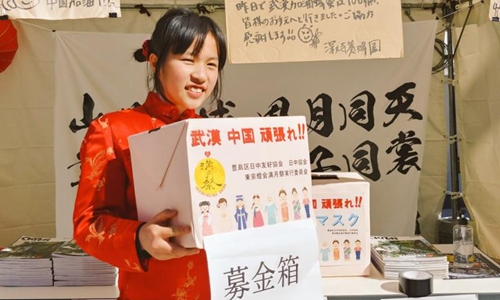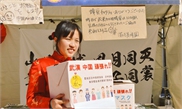
A 14-year-old Japanese girl raises donations for Wuhan, capital of Central China's Hubei Province and epicenter of outbreak of the novel coronavirus, on Saturday in Tokyo, Japan. She did the same on Sunday. Photo: Courtesy of the Executive Committee of the Tokyo Lantern Full Moon Festival Ikebukuro 2020
Chinese netizens not only expressed their appreciation for Japan's recent assistance in battling the novel coronavirus, but also had a heated discussion over the ancient Chinese poems posted on the boxes of Japanese donations to China.
Together with another three organizations in Japan, NOP Renxin Association, a non-profit organization of ethnic Chinese in Japan, donated 3,800 protective outfits to Central China's Hubei Province. And on the boxes with the supplies, they placed an excerpt from an ancient poem in Chinese - "How can you say you lack clothes? Don't worry, I will share mine with you."
The excerpt comes from an ancient poem compilation dating from the 7th to 11th centuries BC.
The association told the Global Times that as their first batch of donations are protective outfits, the poem shows their determination to fight the virus together with medical personnel in Hubei and their wish to protect the medical staff.
Pictures of the donations with the poem went viral on Chinese social media. As more poems with donations from Japan were found, netizens started a heated discussion over whether traditional Chinese culture is better preserved and appreciated in Japan.
Chinese netizens made the comparison between straightforward slogans widely used by domestic organizations such as "Stay strong, Wuhan!" and the intricate poems. "Compared to the classic poems used by Japanese, our slogans seemed too explicit and simple and have less cultural connotations," a netizen said.
"It is pointless to make such comparisons. Japan pays attention to cultural education. But it is still China that inherits the traditional culture and we have been promoting its beauty in recent years," Lian Degui, a professor at Shanghai International Studies University, told the Global Times.
Lian said that straightforward slogans are motivational. Such a comparison may be aimed at drawing public attention to the education of traditional Chinese culture.
Other Chinese netizens also pointed out that these poems showed that China and Japan have been bound deeply in history and that the two peoples have a shared culture.
The Global Times found out that many of the poem stickers were proposed by Chinese living in Japan.
The poem written on the package of the aid materials sent to the city of Dalian, Northeast China's Liaoning Province, from Maizuru, a city in south-central Japan, was created by the great poet Wang Changling from Tang Dynasty to show that Chinese and Japanese although living in different places share the same moon light.
Kojima Hiroshi from Maizuru's international exchange department told the Global Times that a Chinese working in the department firstly put forward to use the poem and others agreed as it precisely expressed the profound friendship of the two peoples.
"Snow melts into the Liaohe River, flowers bloom on Mount Fuji. We are like tree branches from a towering tree and look forward to spring." This poem were printed on the boxes of assistance from Japan's Toyama prefecture to China's Liaoning and was made by Sun Xiao, a liaison working staff in Toyama.
On the boxes of masks donated by a Japanese HSK Bureau, a Chinese-language verse said, "Though miles apart, we are under the same sky."
The line was from an ancient poem depicting the long-lasting friendship between China and Japan. Records show these words were embroidered on a thousand cassocks gifted to the Tang Dynasty of ancient China by Prince Nagaya of Japan in the 8th century.
Seno Kiyomi, former Consul-General of Japan in Chongqing, told the Global Times that Japanese culture originated from China, and characters and poems were also introduced to Japan through ambassadors from the Tang Dynasty, noting that primary and high school students in Japan learn ancient Chinese, recite ancient poems, and read Chinese classics such as Romance of The Three Kingdoms.
No matter who comes up with the verses posted on the aid materials, they all show the deep friendship between two peoples, said Kiyomi. He stressed that Japan and China are originally from the same root, and at this critical moment in the fight against the novel coronavirus epidemic, the use of Chinese characters and poetry to convey Japanese wishes is more profound.



